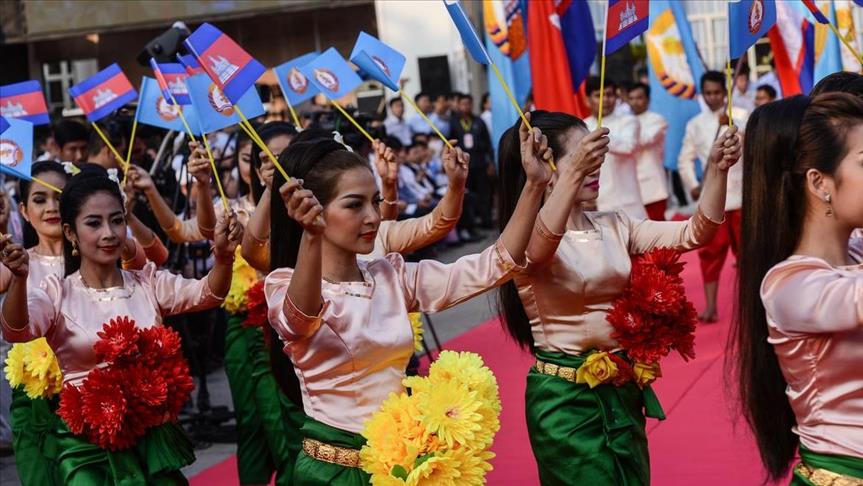Cambodian ruling party marks fall of Khmer Rouge regime
Choir sings patriotic songs, longtime PM releases doves and calls those who don’t support anniversary of regime’s defeat to Vietnamese forces ‘lovers of genocide’

Phnum Penh
By Lauren Crothers
PHNOM PENH, Cambodia
Dignitaries, government officials and students gathered Thursday to celebrate 37 years since the fall of the Khmer Rouge, with Cambodia’s longtime premier warning that those who do not support what is now known as Victory Over Genocide Day are lovers of genocide.
In many ways it deviated little from previous years, save for the notable absence of former Senate President Chea Sim, who died last year, and whose face used to appear alongside Prime Minister Hun Sen and National Assembly President Heng Samrin.
Together, the three Khmer defectors have credited themselves with being part of the front that took the country back from the ultra-Maoist regime, under which millions of people died.
In a four-page speech delivered to the hundreds of people packed into the Cambodian People's Party headquarters, Hun Sen spoke of his countrymen and women “living in harmony with hope of glittering peace” after shaking off the yoke of the restive 1970s.
He added that Cambodia’s “social transformation” was “beyond anyone’s imagination.”
A choir sang patriotic songs, the premier accepted flowers from diplomats and other government figures and he and Samrin released doves into the sky.
Hun Sen said that in 2015, Cambodia advanced from a low-income country to a lower middle-income country, with a poverty rate at 13.5 percent and a GDP of $1,228.
These and other results, he said, were due to the “fruits of the Royal Government’s efforts.”
Although Jan. 7, 1979 is recorded in the history books as the day the Khmer Rouge fell to invading Vietnamese forces, it has been a bone of contention for the opposition party, who have argued that it only heralded a years-long occupation by the Vietnamese.
“Only ones who love the regime of genocide would declare they are against 7 January,” Hun Sen said in reference to these past comments.
“Though there are still political groups and ill-willed circles who keep slandering the historic meaning of 7 January, no matter how hard they try, they cannot reverse the Cambodian situation since 7 January belongs to the people and what they do is against the people’s will and interest,” he said, without naming the opposition Cambodia National Rescue Party.
CNRP spokesperson Yim Sovann and lawmaker Son Chhay could not be reached Thursday.
The Khmer Rouge, battle-hardened from years of civil war with the then-Lon Nol regime forces in the early 1970s, stormed Phnom Penh on April 17, 1975.
They emptied out the capital, forced people into the countryside and began a nearly four-year campaign of brutality that included forced labor, executions and genocide against ethnic minorities such as Cham Muslims.
Members of the Cham Muslim community attended Thursday’s event, with some staying behind after it wrapped to take photos.
The mistreatment and targeting of Chams has been a central theme of what is known as Case 002/02 at the Khmer Rouge tribunal.
Cases 003 and 004, which focus on more mid-level regime officials, however, are vehemently opposed by Hun Sen and his government, who claim that the country would descend into civil war if it were to proceed.
Anadolu Agency website contains only a portion of the news stories offered to subscribers in the AA News Broadcasting System (HAS), and in summarized form. Please contact us for subscription options.

